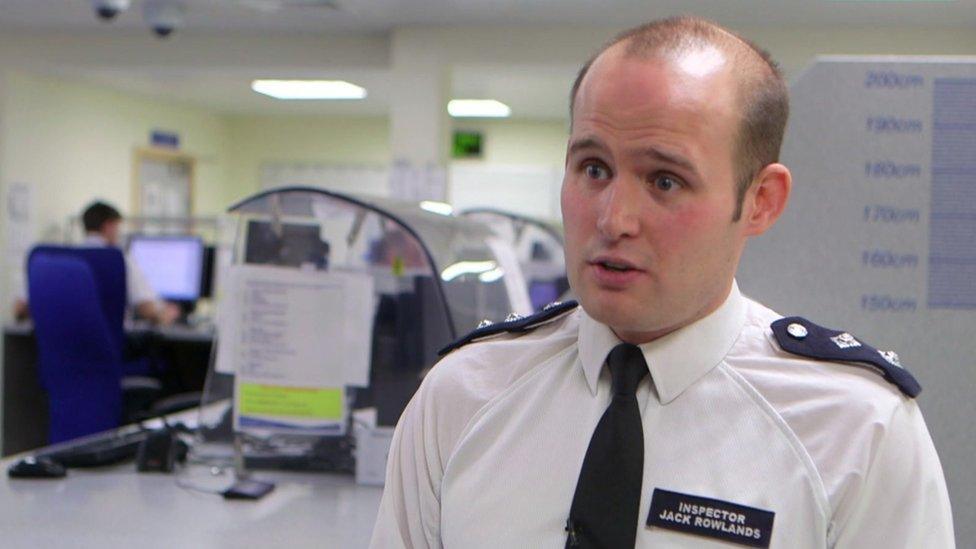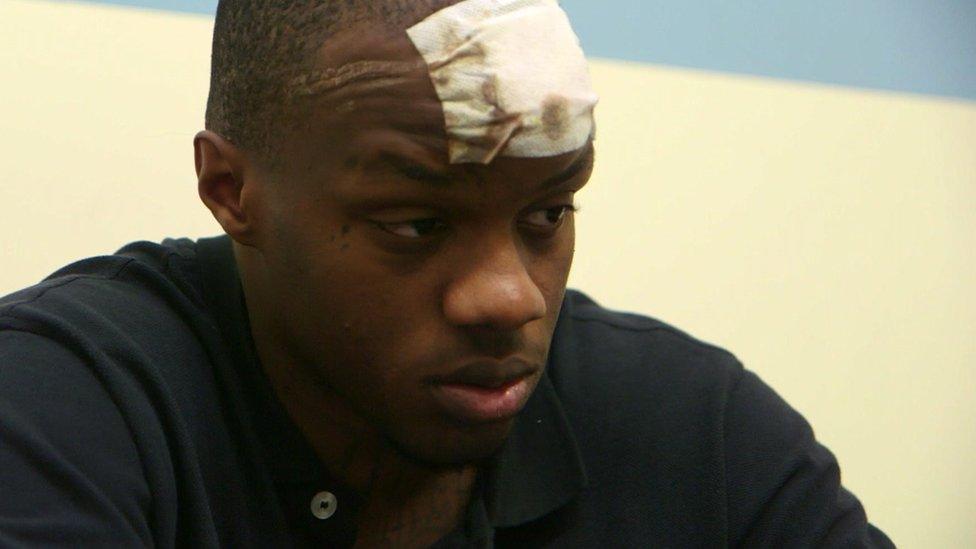Can young adult offenders be diverted into work?
- Published
Danny explains why he chose to participate in the Divert scheme
Some reform groups believe the justice system should treat young adult offenders differently. Could a programme in south London lead the way in terms of their rehabilitation?
"Crime is all I've known for over 10 years... I feel like once you're in the system, you're stuck."
Danny, 25, has been arrested more than 50 times and has 18 convictions for crimes including theft, possession of class-B drugs and public order offences.
He is one of the participants of a rehabilitation programme - known as Divert - run by police volunteers at Brixton Metropolitan Police, in south London, for offenders between the ages of 18 and 25.
It works by approaching offenders in custody in the hope of guiding them into training or employment.
"Within two days of being out [of the police cell], they've constantly been ringing my phone and trying to get me to come and see them," says Danny, who came on to Divert's radar after being arrested in November for criminal damage.
"I have had help offered to me most of the times [I've been arrested before], but it's always been to do with drugs and drink. And I've always just said, 'No' to be honest.
"For some reason, something about these people made me actually feel like they're trying to help."

Insp Jack Rowlands believes there is a lack of support available for young adult offenders who have committed less serious crimes
Through Divert, Danny has been given a job interview with a demolition company, with the prospect of working abroad.
Others find their way into industries ranging from catering to app development and sales, the programme's founder, Insp Jack Rowlands, says.
Since it began in April, Divert has engaged with 138 people - 38 of whom have found and retained employment, training or work experience.
Of the remaining 100, 39 have declined Divert's services and 61 are continuing to work with the scheme.

Find out more
Watch Ashley John-Baptiste's full film on young adult offenders on the Victoria Derbyshire programme website.

Currently, 30% of young offenders in England and Wales reoffend, according to the Ministry of Justice.
But Insp Rowlands believes many possess skills that transfer to the workplace.
"Drugs dealers know risk, they know business strategy, and they know how to sell things," he says.
"When you tell them, 'The line you're going down is wrong, but the skills you have are right to be used in business, and in other areas,' they start understanding that."
Insp Rowlands believes Divert could be extended to other areas.
There are almost 5,000 18- to 20-year-olds in prison in England and Wales, and more than 7,500 serving sentences in the community.
And he says the programme is unique in offering support for those with first and second offences, who risk becoming criminalised.
"When you turn 18, that's pretty much it in terms of getting support [within the justice system], unless you're a serial offender," he says.

Four Divert participants have received training in construction
Max Rutherford, criminal justice manager at the charity Barrow Cadbury Trust, believes the justice system must take a distinct approach with young adult offenders.
"Recent neuroscientific research indicates that the adult brain doesn't mature until the mid-20s," he says.
"Neurological functions of forward-planning, impulse control and empathy are still developing up to age 25," he says, referring to the findings of Exeter University's Prof Huw Williams in a 2013 report, external for the charity's T2A programme.
"We must therefore ask, 'How should the criminal justice system meet the distinct needs of young adults?'"
Mr Rutherford highlights the German system, in which the courts can choose between juvenile or adult sentences for young adults on a case-by-case basis, or the Dutch approach where all young adults under 23 are sentenced under juvenile law.
But not everyone agrees.
Support 'already in place'
Steve Gillan, general secretary of the trade union for prison and correctional workers, the POA, believes offenders over the age of 18 are old enough to take responsibility for their actions.
"Young adults who say they are reoffending because of a lack of support are simply not correct.
"They have received support while in prison from prison officers, and indeed probation officers, voluntary groups and charities."
He adds: "More focus should be on the victims of crime rather than constantly on the offender."
Mr Gillan also believes that while it is important to ensure convicted individuals are supported, investment should be used "to stop them offending in the first place".

Marcus has accepted a position to do creative design work for a magazine
Back at Brixton police station, Divert's project co-ordinator Ann-Marie Nurse is conducting her daily tour of police cells to see if any of the young adults arrested over the past 24 hours would like to work with the scheme.
The first two people she approaches do not wish to be helped, but one man, Marcus, 22, who has a bandage on his left temple, is willing to engage.
"I'm interested in art and design. I can draw anything - tattoos, I design graphics for people," he says, as Ms Nurse tries to gather a sense of his interests, to match him to potential opportunities.
According to Divert, it usually takes the scheme three to five weeks to reach a successful outcome for an offender, but within two weeks Marcus has accepted a position to do creative design work for Disorder magazine.
Without Divert, he says, he would probably find himself returning to the "world of crime" that has surrounded him since he was first arrested at the age of 12. Now, he says, he at least has hope of improving his future.
Watch Victoria Derbyshire weekdays 09:15-11:00 on BBC Two and the BBC News channel. Follow the programme on Facebook, external and Twitter, external, and find all content online.
- Published23 September 2013

- Published14 March 2014

- Published7 April 2014
